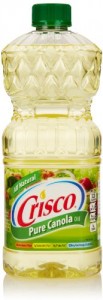Reader question: After watching your TED talk and learning more about GMOs, I’m wondering: Do we stop using canola oil entirely, or just switch to organic, non-gmo canola? I don’t fry (because I’m too lazy to clean up), but I do use canola oil in baking, as I don’t use butter or any milk products. For salad dressings, marinades and stuff like that, I use olive oil. Thanks! ~Angel A., Denver, CO
Angel, I personally advocate for avoiding canola oil entirely.

Yes, I know that canola is used in many of the recipes in my cookbook, but I have learned a lot since I first wrote the book in 2001. I used to be a fan of canola oil, but now I know better. And so should you.
Not only is 90% of our canola crop now genetically modified, but canola is not from a plant that we ate during our evolution on this planet. In fact, there is no “canola plant.” A little history of canola oil can be helpful to know:
Rapeseed oil has been used as an industrial oil to lubricate machinery for a long time because it sticks to metal. During WWII there was a high demand for industrial lubricants and Canadian rapeseed oil producers expanded to meet the demand. After the war, there was an intense effort to breed a rapeseed plant that would produce a low erucic acid rapeseed oil to sell as a cooking oil for human consumption. In 1978, they named it “Canola” to stand for Canadian oil low acid.
The rest, as they say, has been marketing genius.
In terms of replacing canola oil, we want to look for a light, flavorless oil with a high flash point so that it won’t oxidize at higher cooking temperatures and can be used for frying, should you want to. Here are some better oils to consider in place of canola:
- Safflower oil
- Sunflower seed oil
- Grapeseed oil
- Rice bran oil
- Organic soybean oil


3 Comments on “Substitutes for Canola Oil”
What about coconut oil? I’ve been substituting that in baking in place of butter or canola oil. Interested in your opinion of coconut oil.
I’m a big fan of coconut oil, especially in place of butter and canola oil in baking. Here’s what I’ve said about it in the past: http://elizabethyarnell.com/effortlesseating/2014/09/skinny-co-coconut-oil/
I only didn’t mention coconut oil in this post because its not the first oil I reach for when deep frying and need a high flash point oil.
Lately I’ve been experimenting with making vegan caramels out of coconut milk, maple syrup, sea salt, and coconut oil. I’ll post the recipe soon!
Hi Elizabeth. Thank you for the information on light, flavorless oils to replace canola oil in baking, frying and other applications in the kitchen. Thanks, too, for the history of canola oil. You’ve helped make my lemon cake a little healthier.
Comments are closed.